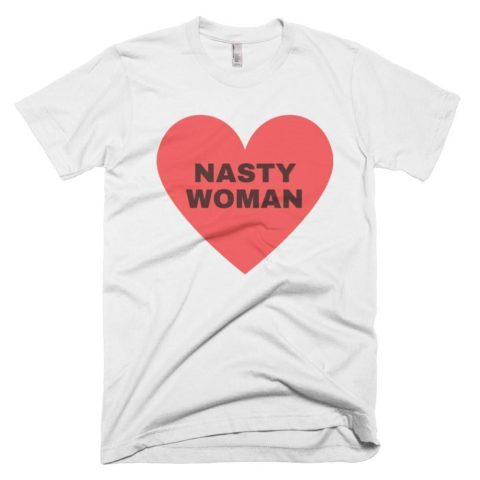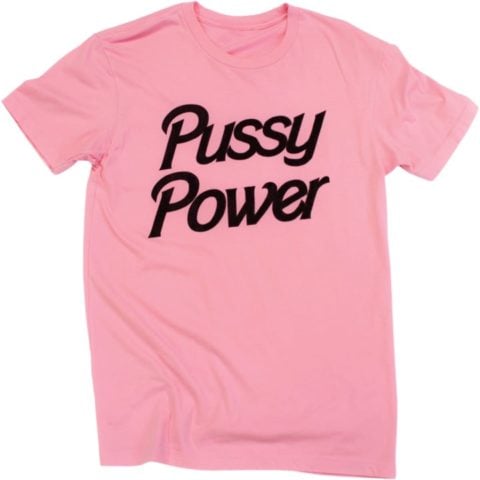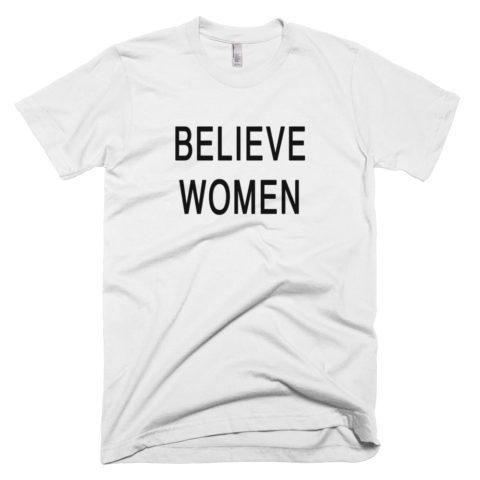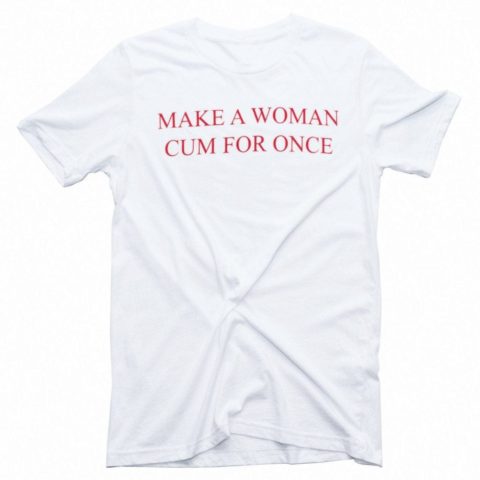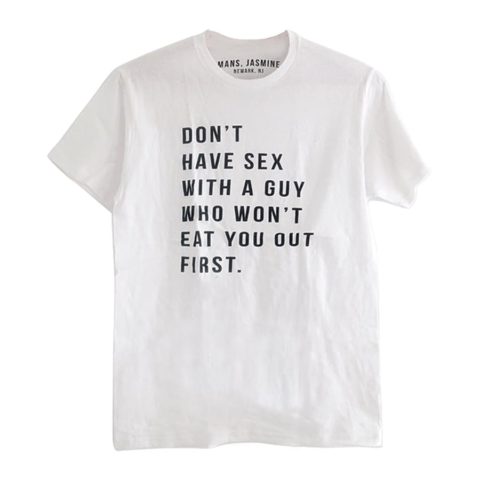The Feminist T-Shirts That Go Way, Way Beyond “The Future is Female”
On the night of the final 2016 presidential debate, during which Donald Trump interrupted Hillary Clinton to call her “such a nasty woman,” contemporary-art curator-cum-hobbyist accessories designer Amanda Brinkman threw together a quick T-shirt idea—Trump’s venomous phrasing in black capital letters inside a pink heart—and uploaded it to her website. When she went to bed that night, her modest online catalogue consisted of roughly five quirky accessories, like enamel pins. By the time she woke up, 10,000 orders had been placed for the now ubiquitous $35 “Nasty Woman” T-shirt.
Since Brinkman’s design went viral (Katy Perry was photographed in one of her T-shirts shortly thereafter), other designers and brands have been creating apparel that is becoming more assailing by the season. On Brinkman’s Los Angeles-based Shrill Society website, available items include a T-shirt that says “R.I.P. Patriarchy, Your Time Has Come,” a baseball cap that proclaims “No Means No” and a T-shirt that declares “Make a Woman Cum for Once” (a rebuttal to Trump’s MAGA merchandise).
“People come to us when they desperately want to have their politics more front and centre in how they present themselves. I don’t want the website to be a space of sarcasm and negativity, but I do want there to be humour.”
“People come to us when they desperately want to have their politics more front and centre in how they present themselves. I don’t want the website to be a space of sarcasm and negativity, but I do want there to be humour,” says Brinkman, who eventually left her curatorial position to run Shrill Society full-time alongside co-founder Cameron Shaw.
When Karlie Kloss, Jessica Chastain and Rihanna donned Dior’s highly publicized Spring 2017 “We Should All Be Feminists” T-shirt, many were quick to criticize the item’s prohibitively expensive $950 price tag. (Dior later announced that an undisclosed percentage of the proceeds would benefit Rihanna’s charity, the Clara Lionel Foundation.) But bemoaning the cost feels idle when the shirt’s main offence is that it broadcasts a milquetoast feminist statement. The more comfortably wearable a statement is, the less it actually says.
Elsewhere on the internet, independent clothing designers are addressing misogyny with unambiguous, intimidating and occasionally vulgar vocabulary that resonates as much as it stings. U.K.-based King Sophie’s World sells embroidered hats, shirts and lingerie bearing statements such as “You’re Not a Bad Boy, You’re Just a Bad Person” and “Maybe I’m Not Too Sensitive, Maybe You’re Just a Dickhead.” Toronto brand Wawa sells sweatshirts that declare “Don’t Touch Me.” And online apparel shop Kidd Bell sells hats, T-shirts, patches and pins—with phrases like “Dead Men Can’t Cat Call,” among other slogans—that take dispiriting feelings and turn them into dauntless proverbs.
These designs have moved beyond palatable girl-power messaging; the point is not to make feminism fashionable but to articulate one’s exasperated opposition to misogyny. While “The Future Is Female” is ambiguous and marketable, “Make a Woman Cum for Once” is an unequivocal corrective that broadcasts a clear demand.
“I think we can look at these T-shirts in the context of a lot of different shock tactics used in feminist movements since the first wave,” explains Rebecca Halliday, a lecturer at Ryerson University’s School of Fashion, in Toronto. For historical context, Halliday points to “idea warfare” artists such as Ilona Granet, who put up street signs around Manhattan in 1986 that warned men against street harassment, and radical art collective SisterSerpents, which formed in 1989 and plastered posters around Chicago broadcasting sentiments like “Rapists Are the Boys Next Door.”
While “The Future Is Female” is ambiguous and marketable, “Make a Woman Cum for Once” is an unequivocal corrective that broadcasts a clear demand.
“The use of powerful slogans also hearkens back to the text-based art of practitioners like Jenny Holzer, Barbara Kruger and Katharine Hamnett,” adds Halliday. “Their work treads the line between the banal and the subversive in order to make people stop and think.”
While SisterSerpents worked anonymously, the resurgence of the #MeToo movement (launched in 2007 by activist Tarana Burke) has created a safe atmosphere for women to openly vent. Conversations about sexual unfulfillment, for example, are certainly not new but have long taken place discreetly, shrouded in shame or resentment.
Jasmine Mans, a poet based in Newark, N.J., whose work includes designing the “Don’t Have Sex with a Guy Who Won’t Eat You Out First” T-shirt, says that this particular shirt is both empowering and utilitarian. “People feel liberated; they feel in control of their body,” she says. “I hope that everybody who wears the shirt is willing to have conversations [about it], whatever those conversations may be.”
It would seem that the more precise, revealing and vulnerable the statement, the more meaningful the act of self-expression. Growing, too, is the insistence that men reckon with any discomfort they feel toward the feminist ideas they see in the world.
Designers and consumers of unreticent feminist slogan T-shirts are aware that passersby will take notice. There is also an educational impact at work. “With everything that I put on a shirt, I hope to cross a line—not for the sake of frivolous confrontation but to approach a deeper truth and a deeper conversation,” says Mans.
It would seem that the more precise, revealing and vulnerable the statement, the more meaningful the act of self-expression.
Kat Planchette, an astrologer from Salem, Mass., says she purchased L.A. designer Chris Mancinas’s “Being Emotionally Manipulative Isn’t Very Punk Rock of You” T-shirt because it resonated with her personally. “When I was in my early 20s, an older punk dude emotionally manipulated and sexually harassed me. I’m still angry about it,” she explains. “This T-shirt is a way for me to express that and to keep future creeps away. It acts like a warning label to the kind of people I don’t want to interact with.”
When I stumbled upon Mancinas’s design myself, during a grim non-breakup breakup last year, the shirt gave me a sense of power. I knew exactly what it meant to me, and I wanted others to know the same.
“[Slogan T-shirts] might force people, even momentarily, to consider something through a lens that’s different from the one they’re currently looking through,” says Brinkman. “Any time you can encourage someone to think outside of themselves, it builds empathy and promotes the potential for change.”
“Stating your position is the first step toward becoming more politically active, and sometimes it’s difficult to find the words to articulate it yourself,” says Maryam Pugh, owner and CEO of Philadelphia Printworks, who claims her company’s designs are more aligned with activism than fashion. “These conversations are more nuanced than the shirts imply, but they’re an entry point.”
“With everything that I put on a shirt, I hope to cross a line—not for the sake of frivolous confrontation but to approach a deeper truth and a deeper conversation.”
In 2009, fashion designer-activist Katharine Hamnett told The Guardian that political slogan T-shirts are “a way of people aligning themselves to a cause. They’re tribal. Wearing one is like branding yourself.” Later, she wrote in an op-ed: “A million T-shirts later, I’ve come to the conclusion that to really alter things—from climate change to women’s rights—we need legislation. Marches, petitions and fashion statements are all great, but they haven’t worked.” Perhaps the way to view this emergence of instructive, intimidating feminist fashion is not as a comprehensive revolution but rather as an amplifier of personal revelation that’s powerful in its own way.
Courtney Rincon, a hairstylist and makeup artist from Beeville, Tex., says she feels “strong and confident” when she wears her “Leave Him on Read” bodysuit. “For me, it’s a reminder to men that I don’t need them,” she says. “I needed to get back to my Cardi B mood.”
“[Feminist slogan T-shirts] might force people, even momentarily, to consider something through a lens that’s different from the one they’re currently looking through. Any time you can encourage someone to think outside of themselves, it builds empathy and promotes the potential for change.”
It’s not unreasonable to question the ethics of capitalizing on gendered suffering. After Trump tweeted that San Juan mayor Carmen Yulín Cruz was “nasty” in the wake of Hurricane Maria in 2017, Shrill Society’s “Nasty Woman” items enjoyed a boost in interest. But Brinkman says she doesn’t “create apparel or lifestyle objects that feed on trauma.” (To date, Shrill Society has donated $182,225 to Planned Parenthood and other charitable organizations, including Unidos Por Puerto Rico.)
It’s something that other feminist-owned apparel companies say they think about, too. “Any time something really bad happens, unfortunately, we see a boost in sales, because people are trying to find ways to share their own beliefs or invest in communities they want to support,” says Pugh.
“I think the main concern with incorporating feminist slogans into fashion is that these are always commodities, so their messages are already being co-opted under neo-liberalism and the need to sell fashion as items that are on-trend,” suggests Halliday. “That said, some of these T-shirts are so, so dark that they resist co-optation somewhat.”
“A million T-shirts later, I’ve come to the conclusion that to really alter things—from climate change to women’s rights—we need legislation. Marches, petitions and fashion statements are all great, but they haven’t worked.”
Indeed, the combative and demanding nature of the shirts means they are unlikely to become the next “Nasty Woman.” (“Are you going to wear a shirt that says ‘Don’t Have Sex with a Guy Who Won’t Eat You Out First’ to Thanksgiving? No,” says Mans.)
But it is verisimilitude, not popularity, that gives them power. “I think these slogans give people a passive way to communicate raw emotion and trauma in a world where it’s tempting to scream,” says Planchette. “Sometimes it’s just easier to buy a T-shirt.”
Shop feminist slogan T-shirts below
The post The Feminist T-Shirts That Go Way, Way Beyond “The Future is Female” appeared first on FASHION Magazine.
